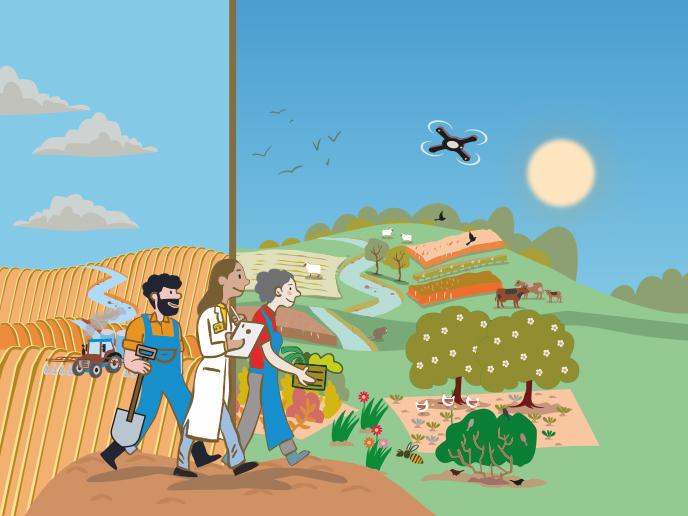Agroecology: research for resilient, sustainable, climate-, ecosystem- and social-friendly farming systems
Over the last 70 years, the farming sector has achieved great success in the first goal, but this has often come at the cost of environmental degradation, land and water pollution, negative impacts on biodiversity, and a high carbon footprint. Agroecology offers a way to couple the EU’s food production needs with environmental stewardship and climate ambitions. It has been identified as an approach that can be supported through the eco-schemes under the first pillar of the revised common agricultural policy(opens in new window). Horizon 2020 and its successor, Horizon Europe, are playing a key role in developing agroecology in Europe by supporting specific research and innovation projects. Through breeding programmes, field trials, novel technologies, living labs, stakeholder networks, policy recommendations and more, EU-funded research is increasing agroecology’s knowledge base and methods, and is strengthening the EU’s R&I system for agroecology. The importance and potential of agroecology has been underscored by the food security crisis caused by the war in Ukraine(opens in new window), and the need for sustainable farming approaches that reduce the agricultural sector’s reliance on inputs from outside of the EU. The European Commission, EU Member States and countries associated with Horizon Europe, coordinated under a Strategic Working Group on Agroecology within the Standing Committee on Agricultural Research (SCAR)(opens in new window), have co-created the foundation for a future Horizon Europe partnership on ‘Accelerating farming systems transition: agroecology living labs and research infrastructures’(opens in new window), to be tentatively launched in 2024. The overarching goal of this partnership is to align EU and national research agendas in this promising research area to tap into the potential of agroecology to accelerate the transition towards resilient, sustainable, climate-, ecosystem- and social-friendly farming systems. The research and innovation activities will also support the objectives of the new organic action plan(opens in new window), in line with the Commission target to have at least 25 % of agricultural land under organic production by 2030. This new Results Pack on Agroecology presents 14 EU-funded research projects that are helping to shape the future of farming. These projects are contributing to an increased understanding of the practical implementation of agroecological practices, along with their environmental, climate, economic and social benefits. By sharing these successes, we hope to inspire and mobilise stakeholders to work together to scale up this important research area. This Results Pack on Agroecology highlights a broad range of EU-funded research and innovation activities, and showcases a variety of ways in which agroecology can support sustainable agriculture and environmental protection. The CORE Organic Cofund project is a network of European ministries and research councils dedicated to funding research in organic farming and farming systems. To grow the knowledge base around agroecology, BIOFRUITNET focuses on building networks and structures to better gather and share information between stakeholders. ALL-Ready and AE4EU are working to strengthen Europe’s research and innovation system for agroecology by increasing connections among all actors and establishing networks of living labs and research infrastructures. The BRESOV and EUCLEG projects seek to enhance resilience and productivity of crops used in sustainable farming, while ECOBREED brings together partners from around the world to build a better supply of organic seeds. Through their work with farmers, DiverIMPACTS demonstrates how agroecological practices such as crop diversification, can be adapted across a range of European climates and habitats. SUPER-G lays the groundwork for sustainable and profitable grassland systems across Europe. Adding to this, RELACS, Organic-PLUS and IWMPRAISE examine how to reduce and phase out the use of contentious inputs such as copper and other plant and animal health products used in organic farming, as well as herbicides. And to facilitate the adoption of agroecology, CONSOLE and Contracts2.0 showcase novel frameworks to promote the creation and valorisation of environmentally friendly public goods.



